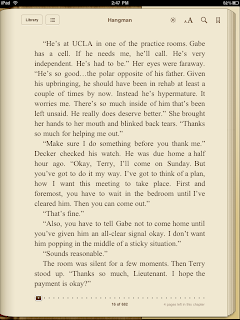"Essentially, we have added a new stage to life. But for most people it's not about what stage you are in; it's about the overall journey."Henkin's statement made me think about my journey and the journey of others around me, and how technology has changed that journey.
As you all know, I went back to Pace University for my master's degree in publishing a few years ago, and with luck and perseverance, I will finish it this December. I took about half of my courses online, and I wrote about that experience previously. I know others who went back to school recently, life long academics who are returning to school to be retrained, to take up new interests, to do something different.
However there are Boomers out there who just want to learn as much as they can about different topics, who want to exercise their brains, and who aren't after a degree. Unlike the scarecrow in the Wizard of OZ, they don't need a diploma. As the Wizard said:
"We have universities, seats of great learning, where men go to become great thinkers. And when they come out, they think deep thoughts and with no more brains than you have. But they have one thing you haven't got: a diploma."
And there are those of us with enough degrees already. Recently, my husband --a very accomplished man with several degrees, not in science-- became interested in the topic of Biology and Evolution. At first he found several PBS Nova TV shows online about the topic, but that wasn't enough. He wanted to delve into the subject deeper. My son pointed him to the wealth of university lectures available online, and for the last week or so, he has been watching and listening to lectures on this topic given by a professor from Yale University.
Just think about that, Boomers! We may not be the first generation of people to return to school after their children are grown. (I had an uncle who consistently audited college courses after he retired.) However, we are the first generation to have such a wealth of free educational materials available to us online. We are the first generation that doesn't have to travel to enrich our lives with education. You can have arthritis, be a shut in, and still benefit. My uncle had to travel to the campus to take his course, he had to enroll in classes, even to audit them. However, if you don't care about getting a degree, you don't have to enroll. You don't have to pay anything--except the cost of a broadband or even a dial-up connection-- to get this education.
And it's not just any education. We can see lectures from the best educators at the best universities. If you don't understand the subject matter the first time, you can listen to the lectures as many times as you want. How wonderful is that? And how powerful?
How do you find these lectures?
Go to Google and type in "University Lectures Online Free" and your search results will come up with a number of choices.
A trip to Yale's Open Courses at www.oyc.yale.edu brings you to this page or one similar. The featured courses change frequently:
If you click on the Courses tab, you'll find the whole list of courses offered online. It's quite extensive, but Yale is far from the only college that gives away its education for free. YouTube has many lectures given by university professors posted as does iTunes. In both of these websites, all you have to do is search for "university lectures." Some lectures are available in video form, some can only be listed to as an MP3 or a Podcast. You can listen to a lecture on the Economic Crisis and Globalization, or one about the Geography of US Presidential Elections, or Art History and English lectures. Whatever your desire, you can dabble in these courses, and if you are very interested, you can listen to the entire series.
A while ago, I posted about brain games for Boomers. Playing games that are difficult for you and require you to learn a new way of thinking is definitely something Boomers should do. Scientists speculate that playing games help you create new synapses and help keep your brain young. But so does learning any new skill or concept.
For enjoyment, I highly recommend online courses by great lecturers. I believe you will find listening and viewing rewarding and also strangely compelling. Once you start being bombarded with new ideas, you'll want to keep going.
Happy learning, Boomers!












